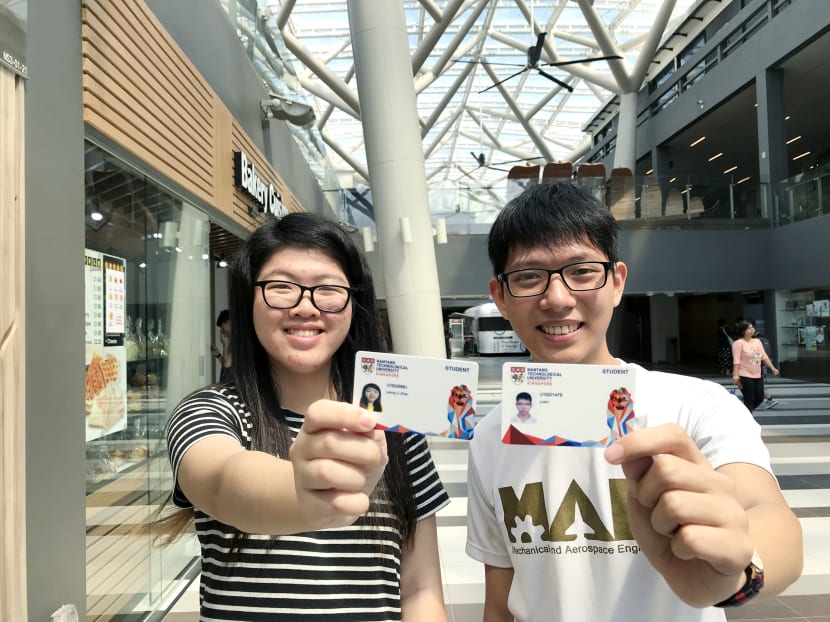New multi-use smart card for NTU students to make payments, gain entry to facilities
SINGAPORE — Students at Nanyang Technological University (NTU) are getting new smart cards that will enable them to pay for their meals at canteens, book facilities such as sports venues and study rooms, for parking on campus, or to use it for public transport.

Year 3 students Leong Li Zhen (left) and Justin Wongso (right) holding up the NTU Smart Pass card. Photo: Toh Ee Ming/TODAY
SINGAPORE — Students at Nanyang Technological University (NTU) are getting new smart cards that will enable them to pay for their meals at canteens, book facilities such as sports venues and study rooms, for parking on campus, or to use it for public transport.
Set to replace the old matriculation card, the NTU Smart Pass will double up as the identity card for the 33,000 or so students, as well as for its staff members. The card comes with an embedded “contactless” identity chip, and has a Nets FlashPay function as part of a tie-up with payment solutions provider Nets.
As part of a vision to transform NTU into the “largest smart campus in Singapore”, the card was officially launched on Wednesday (Jan 10) by NTU’s new president, Professor Subra Suresh, at his first university town-hall meeting with staff and faculty members since he took over the reins from Jan 1.
It is ready for use at 80 per cent of the university’s canteens, with the rest coming on board in the next few months. The majority of the retail and food-and-beverage outlets on campus are already equipped with the Nets contactless payment system as well.
To ramp up safety and security at the university, the card will act as a personalised key for access to hall rooms, offices, laboratories and facilities, though it will take time for older halls to be equipped with the access system.
At the campus medical centre, students may also eventually use the card to register for health checks and consultations, while at residential halls,
NTU is working to put up vending machines with similar cash-free payment systems. Other mobile or cash-free payment solutions are being explored for the card.
Undergraduate Leong Li Zhen, 22, who received the card in September last year, found that it is smoother to use it to make payments. The third-year student from the School of Electrical and Electronic Engineering added: “When I buy food, I don’t have to carry my whole wallet (while balancing it) with the tray… I can just carry one card.”
Agreeing, third-year mechanical engineering student Justin Wongso, 20, who stays in a hall, said that it “saves time and makes transactions much more convenient”.
Calling NTU’s green campus the “ideal place to research, testbed and showcase new smart technologies”, Prof Suresh highlighted plans to expand the use of robotic technology on campus, such as having robot cleaners and roaming robots in canteens that pick up food trays. These will be launched later this year.
As for its goal to be an eco-friendly campus, NTU hopes to achieve a 35 per cent reduction in energy, water and waste intensity by 2020. More than 95 per cent of buildings spread across the 200-hectare campus are now Green Mark Platinum-certified. The certification is part of the Building and Construction Authority’s green rating system that evaluates buildings for their environmental impact and performance.
NTU to launch new degree programme in data science and AI
Starting from the new academic year in August, Nanyang Technological University (NTU) will be introducing a new undergraduate degree programme in data science and artificial intelligence.
Jointly developed by the School of Computer Science and Engineering and School of Physical and Mathematical Sciences, it will take in some 20 to 30 students for a start.
Professor Ling San, provost and vice-president (Academic), said the new degree programme would be “rigorous and demanding”. Students will be taught the basics of computer science, mathematics and statistics, and application-based areas.
The number of places in the degree programme will “grow organically”, said Prof Ling at a press conference on Tuesday (Jan 9).
NTU is ranked the top university in the world for Artificial Intelligence (AI), according to a ranking jointly compiled by Nikkei and Elsevier that measured research citations between 2012 and 2016.
NTU’s new president Subra Suresh said the world is in a state of rapid transformation and technological change.
With NTU’s “unique intellectual portfolio” that spans engineering and the humanities and social sciences, he said digital literacy is imperative in grooming students to be “productive citizens in the digital world.”
The university will also introduce new core educational modules to enhance students’ digital literacy. They will cover the Internet of Things, cybersecurity and issues like ethics.
“We’re not trying to make everyone an expert in IT, but what we hope to achieve is to make sure that even when a humanities major leaves the university, he or she is aware of the possibilities of digital technologies, and (is) also aware of the risks, pitfalls, and constraints,” said Prof Ling.









